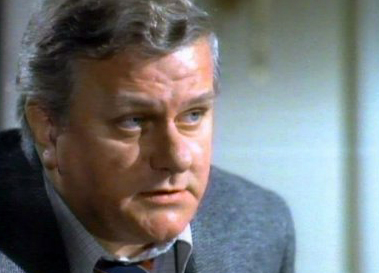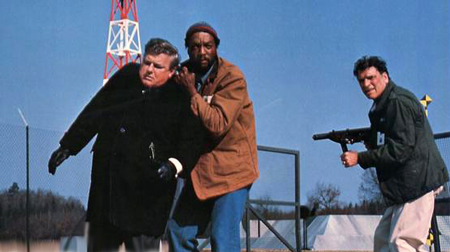
 |
|
|
|
Director Robert Aldrich spent a career making highly personal films, a number of them big successes. Whenever he scored a solid hit -- with Vera Cruz, What Ever Happened to Baby Jane?, The Dirty Dozen and The Longest Yard -- he'd follow up with a risky show, such as his intellectual, violent take on Mickey Spillane, Kiss Me Deadly. For much of his career Aldrich ran his own production company, "Associates and Aldrich" and for a few years bravely undertook to manage his own film studio. After the smash The Longest Yard he was once more considered a bankable director. But Aldrich believed in message pictures about important topics. He turned down a big fee and a 10% profit stake in Joseph E. Levine's A Bridge Too Far to instead go to Germany to direct Twilight's Last Gleaming, a thriller about a nuclear terror incident set in the near future. Aldrich was drawn to movies with apocalyptic themes. His World for Ransom, Kiss Me Deadly and Sodom and Gomorrah threaten to blow up the world; critic Andrew Sarris pointed out that many of his titles allude to various visions of "the end": Ten Seconds to Hell, Autumn Leaves, The Last Sunset, The Big Knife, Too Late the Hero. Twilight's Last Gleaming suggests little, preferring to loudly proclaim the end of our trust in government and warn of a new era of "morally motivated" terrorism. The movie re-ignites the controversy of The Pentagon Papers, Daniel Ellsberg's revelatory document leak that revealed that our entry into Vietnam was a calculated deceit directed to mislead the American people. Shaping us as a sustained, grueling terrorist siege, Aldrich's show can be described as a nuclear threat version of Dog Day Afternoon. We're told that the Walter Wager source novel is a simple extortion caper, but that Robert Aldrich re-imagined the story as a political attack on what President Eisenhower called the Military Industrial Complex. Railroaded by the Pentagon for vocally contradicting military policy, Air Force General Lawrence Dell (Burt Lancaster) escapes with his fellow prisoners Willis Powell (Paul Winfield) and Augie Garvas (Burt Young) and seizes an ICBM silo containing nine nuclear missiles. They kill several soldiers and imprison Captain Stanford Towne (Richard Jaeckel). Commanding General MacKenzie (Richard Widmark) reports the takeover to President David Stevens (Charles Durning), who convenes his cabinet. The fanatic Dell claims that he is willing to initiate a nuclear war if President Stevens doesn't make public a secret document admitting that the Vietnam War was a fraud perpetrated to intimidate the Russian communists. As maintaining the secret is judged more important than any other consideration, Stevens sanctions General MacKenzie's plan to wipe out Dell and his cohorts with a small nuclear bomb. But MacKenzie has assumed that Dell cannot launch the missiles and is bluffing. When things go wrong, a machine gun battle breaks out in the control room, and Dell and Powell set the launch sequence in motion. 
Twilight's Last Gleaming sees Robert Aldrich teaming once again with Burt Lancaster, his longtime collaborator from Apache, Vera Cruz and Ulzana's Raid. The liberal Lancaster was no stranger to politically oriented movies, having played a different kind of fanatic general in John Frankenheimer's Seven Days in May and a conspirator in the speculative JFK assassination docudrama Executive Action. General Dell is an idealistic patriot who believes in the honor of his uniform, yet is also willing to kill untold numbers of innocents in a nuclear war. Despite his sincerity, he's ultimately little more than an unfortunate mad dog, and not a good figure on which to hang a liberal conspiracy thriller. The film's overt political aim is to demonstrate the hypocrisy and dishonesty of the military, the cabinet and the President himself. President Stevens declares his personal outrage over the shocking Pentagon document but soon falls into line with his advisors. They'll risk anything to keep the lid on secrets that would damage the government's ability to claim the moral high ground. As prison escapee Willis Powell states, the men in power will kill anybody, even the President himself, to maintain the status quo. But the audience of 1977 was way ahead of Aldrich's urgent message, and more importantly, they no longer cared. The Pentagon Papers flap mostly inspired calls for better government security, not a large-scale public demand for reform. Americans instead became more cynical or retreated from disturbing political matters. This issue was fairly well stated at the conclusion of Sidney Pollack's 1976 paranoid thriller Three Days of the Condor: disillusioned spy Robert Redford catches the CIA conspirator Cliff Robertson dead to rights and threatens to divulge everything to The New York Times. Cliff tells him to go ahead: as long as the government delivers cheap gasoline, nobody will listen to him. Twilight's Last Gleaming is not as cogent as it wishes it were. 
Robert Aldrich was known as a tough-minded director who cared passionately about his movie projects and gathered a loyal group of "Associates", such as Michael Luciano, who edited almost all of the director's American movies. At 144 minutes Twilight's Last Gleaming follows Aldrich's deliberate and literal approach to suspense. He'd previously intercut parallel actions to create tension: will Joan Crawford reach the telephone before Bette Davis returns from her trip to the bank? Five or six minutes grind away while we wait to find out. In this show Aldrich and Luciano make effective use of split screens to show multiple parallel actions simultaneously. Actions that play out in real time seem more immediate, when we see all the information all at once: a pair of commandos set a nuclear device on one side of a steel door, while on the other side General Dell and his fellow gunmen begin to guess that just such a commando sneak attack might be taking place. Split-screen sequences were something of a passing fad in the late 1960s and remained in occasional use, often in the mechanical suspense movies of Brian De Palma. In Aldrich's show the technique is honest and unaffected. Aldrich didn't always keep a tight control on performances -- Ernest Borgnine inexplicably overacts in several of his pictures -- but screenwriters Ronald M. Cohen and Edward Huebsch give the cast well-defined characters. Lancaster's Dell is resolutely goal oriented, even when his plan goes awry: when one of his own men (played by action icon William Smith) jeopardizes the mission, Dell murders him. Paul Winfield is the voice of underdog outrage, and would be happy to escape the silo bunker with some money and his life intact. Burt Young's somewhat dense gunman is acceptable and movie-combat veteran Richard Jaeckel provides a voice of no-nonsense sanity. Back at the White House, Charles Durning convinces as a Southern Commander-in-Chief very unlike Jimmy Carter. President Stevens is profane under pressure and has a devious political streak but accepts his duty to place himself in harm's way to resolve the crisis. Joseph Cotten, Charles McGraw, William Marshall, Leif Erickson and other cabinet members offer little help except to agree that continued secrecy is essential. Melvyn Douglas makes a strong impression as a deceitful advisor who maintains plausible deniability simply by not answering questions. Gerald S. O'Laughlin has a standout part as Stevens' confidante General O'Rourke, keeping the President's spirits up and the discussion on level ground. In a movie about rigid men carrying out unpleasant duties, O'Laughlin is a pleasant diversion. 
Twilight's Last Gleaming eventually weakens under its own political posturing. We're likely to prioritize the prevention of a nuclear strike far above General Dell's mission to get the truth into the public's hands -- a truth that is more or less already available, if anybody really cared. Aldrich holds a gun to the audience's head for more than two hours only to wrap things up on a cynical note. Despite good intentions the end result is a standard suspense-action thriller with pretensions to political importance. Olive Films' Blu-ray of Twilight's Last Gleaming is an excellent HD transfer of this much-coveted, difficult to see suspense thriller. Colors are excellent, the picture is sharp and all those split screen scenes look much better when presented at the appropriate widescreen aspect ratio. As Olive's releases rarely come with extras, it's a pleasant surprise to see included an excellent new 70-minute making-of-documentary by Robert Fischer. The show has input from Aldrich's daughter Adell, actor Gerald S. O'Laughlin and Aldrich biographer Alain Silver, who paints a full portrait of the director's career and the genesis of the movie. With the help of some of the German crew we learn quite a bit about the shoot, including the fact that the launch-ready missiles we see rising from their silos were excellent miniatures -- filmed from such appropriate angles that they are all but imperceptible. Silver and Adell Aldrich tell us that scenes were filmed with Vera Miles playing Charles Durning's First Lady, but dropped during the editorial process. They also discuss the film's controversial finale. The camera pulls back into the sky as we hear the same patriotic, sentimental music cue played beneath the main titles. Robert Aldrich is well known for shocking audiences with anarchic, violent shock endings, but Twilight's Last Gleaming concludes with a weak attempt at political irony that one would expect to find in a student film.
On a scale of Excellent, Good, Fair, and Poor,
Twilight's Last Gleaming Blu-ray rates:
Reviews on the Savant main site have additional credits information and are often updated and annotated with reader input and graphics. Also, don't forget the 2011 Savant Wish List. T'was Ever Thus.
Review Staff | About DVD Talk | Newsletter Subscribe | Join DVD Talk Forum |
| ||||||||||||||||||